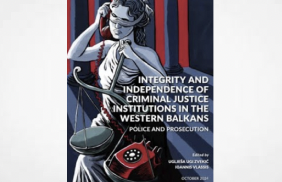Despite reforms, political influence continues to affect prosecutorial and police services across Albania, Bosnia and Herzegovina, Kosovo, Montenegro, North Macedonia, and Serbia (collectively, WB6), hindering effective action against organized corruption. The report provides a detailed examination of police and prosecution services in the region and evaluates the integrity, operational independence, and oversight of these institutions, especially in their role against organized crime and corruption.
WB6 countries face challenges like ineffective internal oversight, low conviction rates for high-ranking officials, and limited resources within dedicated anti-corruption divisions within police and prosecution services. This study emphasizes the need for reinforced accountability, resilience, and operational independence to dismantle corruption networks. Among key recommendations, the report advocates for regional cooperation, stronger educational and training programmes, and enhanced civil society engagement.
Additional insights include the gender disparity in law enforcement, where police forces across the WB6 countries often fall below the EU average for female representation, though there is greater gender equality in the prosecution services than in the police in most countries of the region.
This study offers both regional and specific recommendations for each WB6 country, underscoring the urgency of aligning with EU standards to foster a resilient criminal justice system. Implementing a transparent case management system, protecting whistleblowers, and prioritizing specialized training are essential to improving prosecutorial effectiveness.
Explore the report for an in-depth look at strategies for bolstering integrity and independence in WB6 justice institutions to counter corruption and organized crime.
Learn More
Integrity and independence of criminal justice institutions in the Western Balkans





